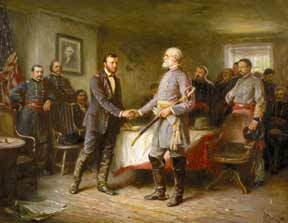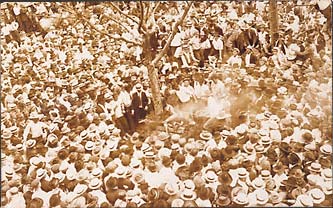“Southern trees bear a strange fruit…” – Billie Holiday (written by Abel Meeropol)
 This week provided a compelling confluence of events and anniversaries related to the end of the Civil War.
This week provided a compelling confluence of events and anniversaries related to the end of the Civil War.
145 years ago today, Confederate General Robert E. Lee’s Army of Northern Virginia surrendered to Union General Ulysses S. Grant at Appomattox Court House in Virginia, which quickly led to the official and final surrender of southern forces less than two weeks later.
Yesterday, Virginia governor Bob McDonnell backtracked from his decision to avoid any mention of slavery as a cause of the Civil War in his official r einstatement of April as “Confederate History Month” in that state. A day after saying he did not note slavery in the proclamation because, “I was focused on the part of the Civil War history and the Confederate Army” McDonnell issued a statement explaining, “The abomination of slavery divided our nation, deprived people of their God-given inalienable rights, and led to the Civil War. Slavery was an evil, vicious and inhumane practice which degraded human beings to property, and it has left a stain on the soul of this state and nation.”
einstatement of April as “Confederate History Month” in that state. A day after saying he did not note slavery in the proclamation because, “I was focused on the part of the Civil War history and the Confederate Army” McDonnell issued a statement explaining, “The abomination of slavery divided our nation, deprived people of their God-given inalienable rights, and led to the Civil War. Slavery was an evil, vicious and inhumane practice which degraded human beings to property, and it has left a stain on the soul of this state and nation.”
 Two days ago would have been the 95th birthday of legendary jazz singer Billie Holiday (she died in 1959.) Among Holiday’s most famous and admired songs is the haunting anti-lynching anthem “Strange Fruit”, penned by a then-New York City schoolteacher named Abel Meeropol, using the pseudonym Lewis Allan.
Two days ago would have been the 95th birthday of legendary jazz singer Billie Holiday (she died in 1959.) Among Holiday’s most famous and admired songs is the haunting anti-lynching anthem “Strange Fruit”, penned by a then-New York City schoolteacher named Abel Meeropol, using the pseudonym Lewis Allan.
Between 1882-1968, there were over 4,700 lynchings in the United States. More than 70% of those lynched were black and over 80% of the lynchings took place in the South (for a powerful photo essay exploring lynching in America, go to James Allen’s “Without Sanctuary”.)
Click to hear the song and continue down to read the lyrics.
- Southern trees bear a strange fruit,
- Blood on the leaves and blood at the root,
- Black body swinging in the Southern breeze,
- Strange fruit hanging from the poplar trees.
- Pastoral scene of the gallant South,
- The bulging eyes and the twisted mouth,
- Scent of magnolia sweet and fresh,
- Then the sudden smell of burning flesh!
- Here is fruit for the crows to pluck,
- For the rain to gather, for the wind to suck,
- For the sun to rot, for the trees to drop,
- Here is a strange and bitter crop.
I do not make the link between McDonnell’s initial decision to ignore the role slavery played in the Civil War and lynching to suggest that the governor in any way condones the brutal practice. Of course, he does not. Instead, it is made to highlight the insensitivity at best–and danger at worst–of those who stubbornly and curiously disregard history to deny troubling truths for personal, political, or other reasons.




